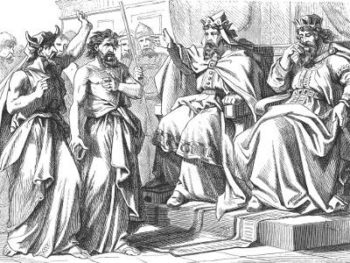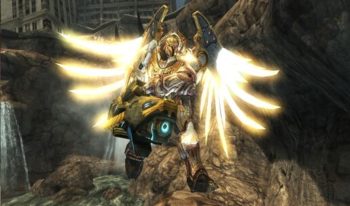Free Original Story World Ideas, Part 3: Agent Angel
This week’s post proposes a story involving the supernatural struggle between angels and demons in a different light. Let’s imagine a story in which an angel needs to infiltrate a group of demons and pretends to be one of them. In order to influence their decisions (or maybe spy on them). Such an angel would act as a secret agent of sorts. Or like a the kind of deep undercover detective used at times by law enforcement or intelligence agencies.
This story world proposal additionally borrows from an idea I floated back in 2012 on my personal blog–concerning angels having technology. But let’s return to that idea near the bottom of the post.
What in the world would make me think of an angel infiltrating a group of demons? I got the inspiration from the Bible, actually.
A Puzzling Bible Passage in I Kings 22
So during the divided monarchy of Israel and Judah, when Ahab was king over Israel, married to his infamous Phoenician-born wife Jezebel, Jehoshaphat shared an overlapping period during which he was king of Judah. And a number of texts indicate Jehoshaphat hoped to undo the division between the two kingdoms and recreate the united monarchy of all twelve tribes of Israel again (he even arranged or at least allowed his son to marry the daughter of Ahab and Jezebel).
The two kings staged a joint attack against the kingdom of Aram, a.k.a. Syria, recorded in I Kings 22. An interesting aspect of this attack is they first sought advice from prophets about whether the attack would succeed or not. Four hundred prophets predicted a huge success. But Jehoshaphat was not satisfied with the four hundred and asks if a prophet of the LORD (a.k.a. Jehovah) might be available. Grudgingly Ahab agrees he had one available–Micaiah, a prophet he disliked because he always spoke ill of him (Ahab).
When given the chance to speak freely, Micaiah not only predicts defeat, he says something very interesting about why all the other prophets predicted success, a statement I’ll quote here (I Kings 22:19-23 NKJV):
19 Then Micaiah said, “Therefore hear the word of the Lord: I saw the Lord sitting on His throne, and all the host of heaven standing by, on His right hand and on His left. 20 And the Lord said, ‘Who will persuade Ahab to go up, that he may fall at Ramoth Gilead?’ So one spoke in this manner, and another spoke in that manner. 21 Then a spirit came forward and stood before the Lord, and said, ‘I will persuade him.’ 22 The Lord said to him, ‘In what way?’ So he said, ‘I will go out and be a lying spirit in the mouth of all his prophets.’ And the Lord said, ‘You shall persuade him, and also prevail. Go out and do so.’ 23 Therefore look! The Lord has put a lying spirit in the mouth of all these prophets of yours, and the Lord has declared disaster against you.”

Micaiah and the kings of Judah and Israel. Image source: Wordfitlyspoken.org
What’s immediately surprising about this is not so much that it shows Jehovah in a heavenly counsel asking the opinion of the angelic beings around Him. Sure, that’s a bit surprising, because the Christian understanding of God as all-wise and all-knowing, along with various Scriptural statements indicating God doesn’t really need anyone’s advice (see Isaiah 46:10, Acts 15:18, Romans 11:33). But as much as God asked Adam what He would name the animals (Gen 2:19-20), God is certainly capable of asking angels for their thoughts, even if He already knows all the answers. So God asking the advice of the heavenly host isn’t a major surprise.
A much bigger surprise is a spirit (or angel, as we’d think of them), suggested engaging in some military deception–which would involve the spirit lying to the false prophets so they would encourage Ahab to ride out to his death (a death that specifically related to Ahab’s previous sins, according to passages previous to I Kings 22). Or we could rephrase this as: “An angel lied. People died.”
Angels are thought of as incapable of sin and lies are generally seen as sinful. In fact, in a passage considerably older than Kings, the Scripture specifically says God does not tell lies (Numbers 23:19). So that an angel would lie to the false prophets and God would approve–that’s pretty shocking!
As someone who teaches the Bible, I’d deal with this by pointing out this is the only place in the Bible in which a created heavenly being subservient to God (a.k.a. an angel) is said to lie. Could it be Micaiah the prophet was lying, not offering a real prophecy? Or could it be he was telling the truth, but this particular heavenly moment was unique, never done previously or since? Or could it be angels can and do lie without committing sin and God lets them do so for unknown reasons? All three of these explanations are logically possible (or at least I think so).
Since this passage stands alone in saying what it does, it’s bad methodology to rework the whole of conventional understanding of angels and for sure declare they tell lies based on this one portion of Scripture. Under the providence of God, the Bible says most often what’s most important and what it says just one time is nothing to build a doctrine off of.
But the rules of writing speculative fiction are different from Bible exegesis. What if, in fact, angels do tell lies that are considered a part of heavenly warfare, just as military strategists engage in military deception during wartime (such as ambushes and faked retreats)?
Lets think about a particular detail of what happened in I Kings 22 for a bit. Micaiah is called upon because Jehoshaphat is seeking a prophet of Jehovah. This would indicate the other prophets were not prophets of Jehovah. Which would mean that the angel that communicated with them was not only giving them a false message, he was pretending to be a representative of their gods!
An Angel Among Demons
But what if an angel did more than pretend to be false gods, who are fairly thought of as relating to demons? (as per a previous post I did for Speculative Faith) For the sake of a story setting only as opposed to a doctrinal statement, what if an angel actually pretended to be a demon, in the company of demons?

A Warrior Angel in black armor. Image source: Pinterest
God clearly doesn’t need intel to know what Satan and demons are up to. It’s God’s nature to know. But perhaps angels might not have all the knowledge God has, so they perhaps could engage in some spying.
But more in line with I Kings 22, what if God wanted to influence demons to do things they otherwise would not have done? And chose to use angels for that purpose? What if angels can and do infiltrate bands of demons?
Wouldn’t that be a highly original take on spiritual warfare? Agent angels, infiltrating bands of demons? Deep undercover, having to do things they otherwise wouldn’t do, playing a role like a DEA undercover agent infiltrating a drug smuggling operation?
A Story Setting With a Caveat
I wouldn’t feel right about putting this story setting into a novel without explaining that this is an improbable view of angels and isn’t likely how they operate. Even though the concept is based on Scripture. In fact, if I were to write this, I’d give the full set of caveats I give in this post in an afterword.
But as a speculative idea, if we can keep in mind the idea is speculative, we can wonder how angels would infiltrate demonic hosts and what kind of torture of soul they’d have to go through to prove they really are demons and what could happen to them if they fail. Or course we could borrow a lot from human experiences as deep undercover agents, but the story would be more interesting if much of what applies to moral humans would not apply to angelic beings. Any author creating a tale in this story setting would need to engage in a lot of imagination concerning how the threats to immortal angels are entirely different than to a human undercover agent.
Angel Tech
Angels dress in clothing and at the end of Genesis 3 defend Eden with a flaming sword. Swords and clothes are the products of technology for human beings but perhaps are not for angels. Perhaps an angel can use a form of spiritual power akin to magic to produce these items.

Angel with tech. Image source: https://powerlisting.fandom.com/wiki/Angelic_Technolog
But perhaps not. Perhaps they have the equivalent of looms and forges, producing the items we associate with angels. Perhaps they have more than that–yes, it seems their own supernatural nature would cover the kinds of things human beings use technology to accomplish. But what if (just speculating without solid data) angels have to use communication devices to contact one another over large distances? Or use weapon or transportation technology unknown to us on Earth?
Perhaps a story that features “agent angels” could also feature high-tech angels… (note in looking for an image for this post, I found a “superpower wiki” that lists angelic technology as one of its articles–I’m pretty sure my own post on this topic is older than Superpower Wiki–but it’s entirely possible I came up with an idea that other people had used long before me).
Inspirational Purposes and Controversy
These story ideas I’m offering not just for anyone willing to copy the exact idea I’m writing about, but also hope they inspire thoughts in new directions, shooting off on tangents from what I’ve said here and in previous posts. If you’re just noticing this series, here are links to Part 1 and Part 2. Note that Shannon McDermott wrote an article for Speculative Faith in 2015 that discusses angels in fiction in a general way and E. Stephen Burnett wrote an article in 2018 about Billy Graham that mentioned his 1975 book Angels: God’s Secret Agents, which does not see angels as agents in the same sense this post proposes, but does use some related concepts.
However, suggesting an idea which portrays spiritual beings differently than how we would expect runs the risk of being too controversial. Dealing with how critics might react to controversial ideas isn’t the focus of this post, but is fair game for the comments section.
So what do you think, readers? Does this idea go too far? Or on the other hand, are you familiar with other stories I haven’t heard of that have story settings similar to what I’m offering?
Or does this post inspire your own unique thoughts on angels? Or have you already conceived of story ideas related to angels interacting with demons apart from this post’s ideas that you’d like to mention in a comment?
Please feel free share your thoughts in a comment below!
(Note my podcast that discusses this idea in different words can be found at: https://travissbigidea.podbean.com/e/free-original-storyworld-ideas-part-3-agent-angel/)









































I write a lot of angel stories, so this is somewhat in the same vein of what some of my characters would do. There would probably be a lot of other issues at play, like the fact that angels might have to do some unspeakably evil things to blend in with demons in the first place. That would probably be of far greater concern than them lying(to demons).
Another thing is that there’s a chance that all the angels might have known each other before Lucifer’s rebellion, and many seem to think that these original first generation angels wouldn’t be able to switch sides later on. If the angels knew/believed this, would they actually be able to work under cover? At least long term?
So I guess it would partly depend on the author’s story world, in terms of how it handles angel allegiances even being able to change in the first place.
In a way I’ve been vaguely surprised in the past when people act like angels couldn’t do anything wrong, or at least things that we would dislike or consider wrong. Some of them made the choice to follow Lucifer, which was obviously wrong. And even if they couldn’t sin, then what does that mean? Likely enough, they would be expected to follow some of the same rules as we would, but some rules may very well be different for them. They’re different creatures, with different jobs and functions than we have.
Furthermore, there seems to be some distinction made for the circumstances/reasons behind certain behaviors that would normally be sins. The Ten Commandments say ‘Thou shall not kill/murder’. But clearly people were still allowed to kill during certain times of war. Lying would probably be similar, especially for angels. Lying and killing for selfish or needless reasons would probably be wrong, but there do seem to be some very narrow circumstances where it might be ok. Like when absolutely needed in a self defense situation. Or, in the case of angels, to combat demons.
Some of my angels behave differently based on what story universe they’re in. But another thing I do is have behavioral differences manifest when they’re in their original spiritual form vs when their spirit is occupying a physical form.
Yeah, the fact all the angels and demons could know each other could be a real problem for this idea…though angels could perhaps capture a specific demon and hold it prisoner, while an angel takes the role of that specific demon. So it still could work, even if these spiritual beings all have eidetic memories and all know each other (which perhaps might not be the case).
As far as distinctions go, that maybe lying is not a sin at all times, I didn’t spell it out, but my mention of military deception might be a case where lying is considered OK. So I was thinking along your lines, but I didn’t explain in detail. I’m not really comfortable with that notion–acceptable lies–to be frank, but there might be something to it.
And as far as angels having to fool the demons, yeah, lying to them would be just the beginning, I’m sure. But this is the same kind of problem secret agents and deep undercover police face as well, right? They are not supposed to commit crimes, but they have to appear as if they DO commit crimes–I think that kind of tension would be interesting with angelic beings.
Yeah, I agree. And the acceptable lies thing does bother me in some contexts. But unfortunately the truth can be used to manipulate just as easily(and perhaps more effectively) than a lie can. And then there’s a lot of times when people just don’t realize or care what the fallout will be if they expose information at a certain time and in a certain way. So truth shouldn’t just be used on its own. There also needs to be a healthy dose of reality involved when considering the motivation, methods, and after effects of revealing information.
I probably would like to discuss that in one of my angel stories, though. The idea that maybe God expects them to engage in truth and lies in a healthy way and maybe gave them the psychological tools to do so at least most of the time.
In Job, Satan has free access to God, the whole Heavenly hierarchy appears to be in attendance. “On a day the angels came to present themselves before the Lord, and Satan also came with them.” (Job 1:6) If demons are fallen angels it is possible that the “angel” that appeared before God in Kings was not an “angel of light” but was indeed a demon himself. Then he could, of course, be a lying voice to the prophets. And then angels (God’s angels) wouldn’t have to lie. Just a thought for consideration.
Interesting thought–one I hadn’t considered. But it would be as weird that a demon is specifically fulfilling God’s will. A demon offering advice doesn’t quite parallel Satan’s role with Job (who can be seen as challenging God and daring Him to prove his points), but rather would seem to make a demon a willing and obedient servant.
That would constitute an entirely different kind of speculative spiritual warfare story!
The enemy is depicted in Job as having to ask God for permission to defy him and hurt his people. And some do believe that God is sovereign to the point that evil/sin only can exist when he allows it to for his own good purposes. I would question if the prophet misunderstood and described what he’d seen in a vision sincerely but poorly. I’ve heard the Jews believed it wasn’t a sin to lie for a good cause such as saving lives by getting an evil tyrant killed. So they wouldn’t see an angel sinning or God condoning sin in this text. God in truth only ever allows evil spirits/people to do evil, for his own good purposes.
The prophet making a mistake is an explanation I hadn’t considered. Thanks for mentioning it.
As for what God allows angels to do, I’m not completely sure. The Bible is not extremely clear about all aspects of what it means to be an angel…
https://www.pinterest.com/pin/751397519066336468/
Ya know, following this link made me feel good that I mostly ignore memes…
SHUN THE NONBELIEVER
Hecc, I just dated myself with that meme. (I am Charlie the Unicorn-years-old.)
Oh yeah. SO OLD!!! 🙂